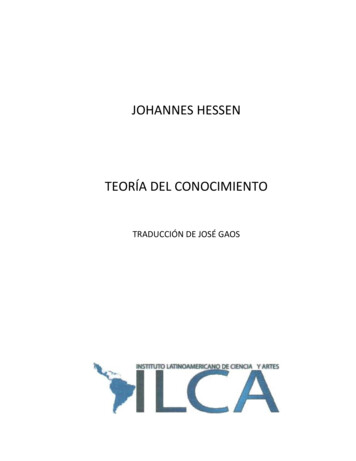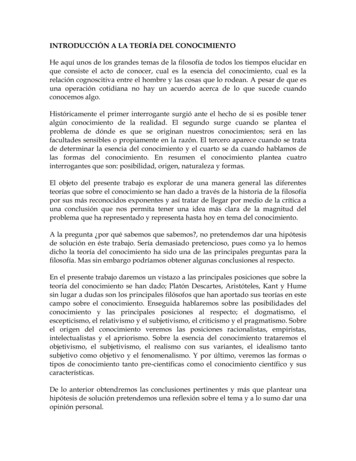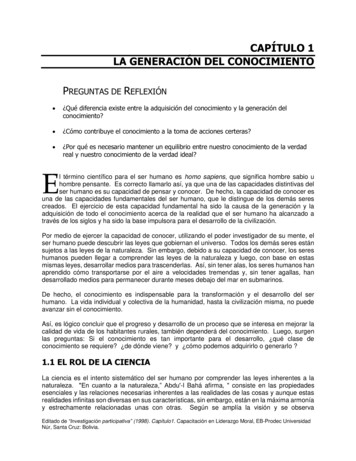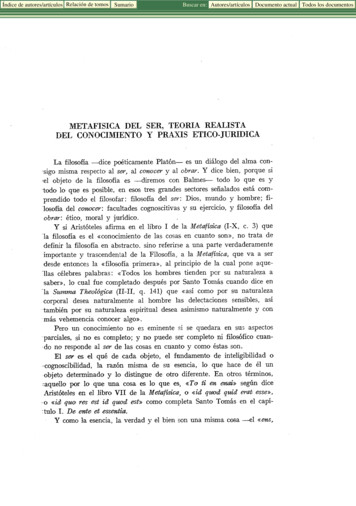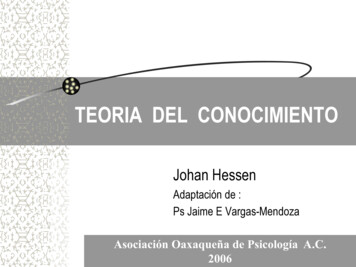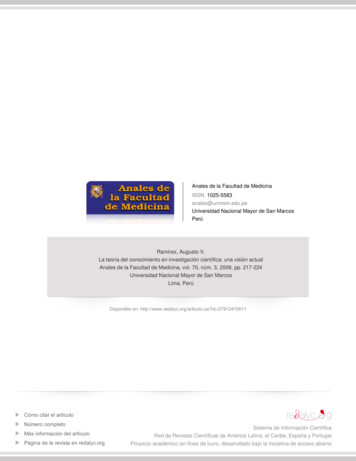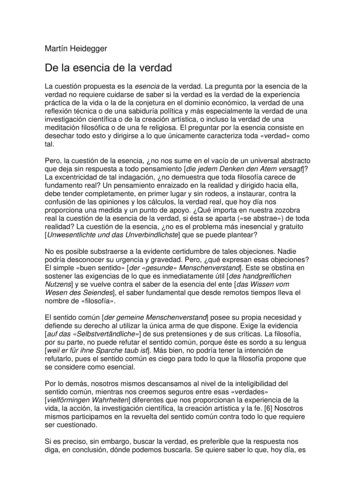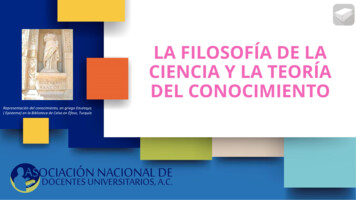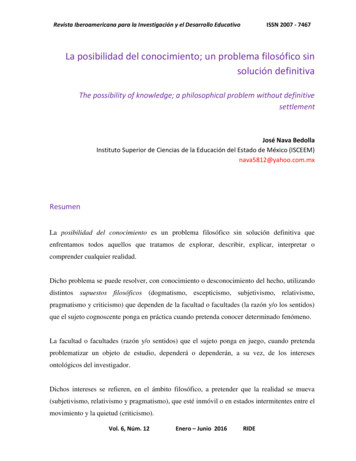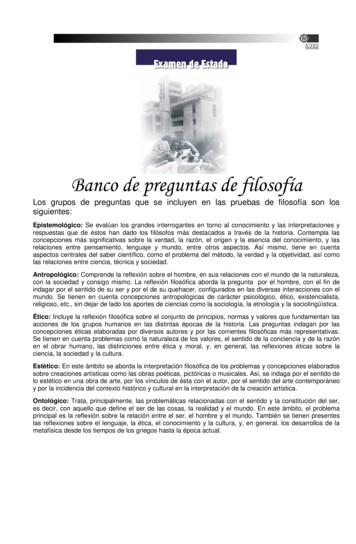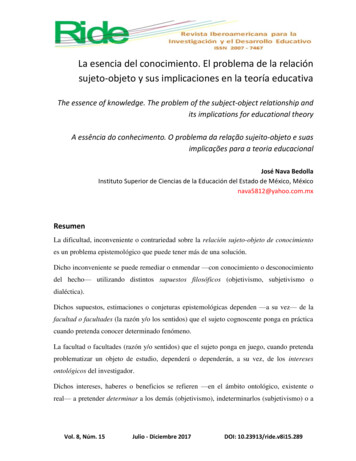
Transcription
La esencia del conocimiento. El problema de la relaciónsujeto-objeto y sus implicaciones en la teoría educativaThe essence of knowledge. The problem of the subject-object relationship andits implications for educational theoryA essência do conhecimento. O problema da relação sujeito-objeto e suasimplicações para a teoria educacionalJosé Nava BedollaInstituto Superior de Ciencias de la Educación del Estado de México, Méxiconava5812@yahoo.com.mxResumenLa dificultad, inconveniente o contrariedad sobre la relación sujeto-objeto de conocimientoes un problema epistemológico que puede tener más de una solución.Dicho inconveniente se puede remediar o enmendar —con conocimiento o desconocimientodel hecho— utilizando distintos supuestos filosóficos (objetivismo, subjetivismo odialéctica).Dichos supuestos, estimaciones o conjeturas epistemológicas dependen —a su vez— de lafacultad o facultades (la razón y/o los sentidos) que el sujeto cognoscente ponga en prácticacuando pretenda conocer determinado fenómeno.La facultad o facultades (razón y/o sentidos) que el sujeto ponga en juego, cuando pretendaproblematizar un objeto de estudio, dependerá o dependerán, a su vez, de los interesesontológicos del investigador.Dichos intereses, haberes o beneficios se refieren —en el ámbito ontológico, existente oreal— a pretender determinar a los demás (objetivismo), indeterminarlos (subjetivismo) o aVol. 8, Núm. 15Julio - Diciembre 2017DOI: 10.23913/ride.v8i15.289
negociaciones entre el determinismo y el indeterminismo (dialéctica) de los otros y denosotros mismos.En el ámbito educativo, es posible observar —derivado de lo expresado en los párrafosanteriores— que las exploraciones, descripciones, explicaciones, interpretaciones ocomprensiones de los fenómenos, hechos o acontecimientos pedagógicos estándeterminados por los intereses ontológicos, existentes o reales de los sujetos que loselaboran.Como consecuencia de este hecho, las teorías de la educación (conductista, psicoanalítica,humanista, cognitivista, psicogenética, sociocultural, etc.) promuevan discursos diferentes ycontradictorios sobre los fenómenos, hechos, acontecimientos o sucesos educativos.En ese sentido, es posible apreciar que a ello obedece la complejidad del fenómenoeducativo y que debido a esto se trata de una cuestión política porque obedece a interesesdiferentes y contradictorios.Palabras clave: objetivismo, subjetivismo, dialéctica, teoría, educación.AbstractDifficulty, inconvenience or disappointment on the relation subject/object of knowledge isan epistemological problem that may have more than one solution.This drawback can remedy or amended - with knowledge or ignorance of the fact - usingdifferent philosophical assumptions (Objectivism and subjectivism and dialectic).These assumptions, estimates or epistemological assumptions depend - in turn - of thefaculty or faculties (reason or senses) which the Knower subject put into practice when itintends to meet certain phenomenon.The faculty or faculties (reason or senses) that the subject put in game, when he intends todiscuss an object of study, will depend on or it depends, in turn, of the ontological interestsof the researcher.Vol. 8, Núm. 15Julio - Diciembre 2017DOI: 10.23913/ride.v8i15.289
These interests, assets or benefits concerning - in the field of ontological, existing or real pretend to determine others (Objectivism), indeterminarlos (subjectivism) or negotiationsbetween determinism and indeterminism (dialectic) of each other and we same.In the field of education, it is possible to observe - derived as set forth in the precedingparagraphs - explorations, descriptions, explanations, interpretations or understandings ofphenomena, events or educational events are determined by real, ontological or existinginterests of subjects who develop them.As a result of this fact, the theories of education (behavioral, psychoanalytic, humanist,cognitivist, notice, socio-cultural, etc.) to promote different and contradictory about thephenomena, made speeches, events or events education.In this sense, you can see that this obeys the complexity of the educational phenomenon andthat because this is a political issue because it reflects different and contradictory interests.Key words: Objectivism, Subjectivism, dialectic, theory, education.ResumoA dificuldade, inconveniência ou aborrecimento sobre a relação sujeito-objeto é umproblema epistemológico conhecimento que pode ter mais de uma solução.Este inconveniente pode ser remediado ou alterar, com conhecida ou desconhecida usandodiferentes hipóteses de fato-filosófica (objetivismo, subjetivismo ou dialectic).Essas suposições, estimativas ou pressupostos epistemológicos dependem, por sua vez,faculdade ou faculdades (a razão e / ou sentidos) que o conhecedor implementar se pretendeatender determinado fenômeno.Faculdade ou faculdades (direito e / ou sentidos) que o sujeito colocar em jogo, se elepretende problematizar um objeto de estudo, ou dependem dependem, por sua vez, dosinteresses ontológicas do pesquisador.Vol. 8, Núm. 15Julio - Diciembre 2017DOI: 10.23913/ride.v8i15.289
Esses interesses, bens ou benefícios relacionam -no nível ontológico, existente ou real fingirdeterminar outros (objectivism), indeterminarlos (subjetivismo) ou negociações entredeterminismo e indeterminismo (dialética) de outros e de nós mesmos .Na educação, podemos ver derivada de dos anteriores expressas nos parágrafos varreduras,descrições, explicações, interpretações ou entendimentos dos fenômenos, fatos ou eventoseducacionais são determinadas pelos interesses ontológicos existentes ou reais de assuntosque elaborado.Como resultado deste facto, as teorias da educação (behaviorista, psicanalítica, humanista,cognitiva, psicogenética, sócio-cultural, etc.) promover discursos diferentes e contraditóriassobre os fenômenos, fatos, acontecimentos e eventos educacionais.Nesse sentido, pode-se ver que isso reflete a complexidade do fenómeno educativo e porqueesta é uma questão política porque obedece interesses diferentes e contraditórias.Palavras-chave: objetivismo, o subjetivismo, dialética, teoria, �n:Julio2017IntroductionIs it possible to know reality? What is the source of human knowledge? What is science?How is it classified? On what criteria can it be accepted that certain knowledge is true orfalse? These questions have not been definitively resolved. What will they do? Will theyhave more than one solution? If so, are these procedures similar or contradictory? And why,some resource, will be better than the others ?, why?Through this article some elements are suggested for the exploration, description,explanation, interpretation or understanding of the mentioned questions and the discussion isopened making an invitation to the readers to reflect on the problems of the humanknowledge, the faculties with which they are Can solve and, derived from it, theVol. 8, Núm. 15Julio - Diciembre 2017DOI: 10.23913/ride.v8i15.289
assumptions that are used for such effect, depending on the ontological and epistemologicalinterests of the researcher.Since the approach to the above problem is very broad and goes beyond the scope of anarticle, a general outline of the main problems of knowledge and the assumptions withwhich they can be resolved will be made, in order to finally concentrate attention on oneOnly of them: The essence of knowledge. The problem of the subject-object relationship.In the first part The problems of human knowledge, a mapping is made on the maindifficulties of human knowledge: definition, characteristics, elements, function, purpose,causes, consequences, classification and other aspects; With a view to locating the problemof the phenomenon under study.In second part The assumptions with which the problems of knowledge can be solved,another mapping on the concept "philosophical assumptions" is made: definition,characteristics, elements, function, purpose, classification and other aspects; And therelation between them and the cognitive capacities of the knowing subject is specified.In the third part How to solve the problem of the subject-object relationship of knowledge?We analyze the different ways in which the problem can solve the subject-objectrelationship of knowledge; Through the use of different philosophical assumptions, whichderive from different capacities that the cognoscent subject can put into play whenestablishing a relationship of knowledge with any object of study: his reason and / or hissenses. In this part is where the relationship between the problem of subject-objectcorrespondence of knowledge and the philosophical assumptions with which it is and / orcan be solved is established; Depending on the ontological interests of the cognoscentsubject.In the fourth part Ontological implications of the subject-object relationship in educationaltheory addresses the different and contradictory discourses that, on educational phenomena,are elaborated from the different theories of education, when they try to define the conceptof student, the notion Of teacher, the idea of learning, setting the goals of education, the roleof the teacher, motivation, teaching methodology or evaluation.Vol. 8, Núm. 15Julio - Diciembre 2017DOI: 10.23913/ride.v8i15.289
If this article succeeds readers' curiosity in exploring, describing, explaining, interpreting orunderstanding the philosophical problems of human knowledge and its implications foreducational theories, it will have accomplished its purpose.Problems of human knowledgeHuman knowledge can be understood as a process in which a cognoscent subject and anobject to be known are related. This means that the essential elements of any process ofknowledge are the cognitive subject, the object to be known and the relationship that mustbe established between them for the knowledge to be given.Before establishing the relation of knowledge, both elements, both the subject and theobject, are only entities; Beings that exist independently of each other. Both are in theontological sphere, in reality, which can be concrete or abstract.The object of knowledge arises inasmuch as an entity (in this case it is assumed that only thehuman being is able to know) fixes its attention on any other being (material or immaterial)with the intention of knowing it because:" Objectivity becomes intentional precisely because the object known is notgiven of itself " (Polo, 2006: 41)And, in turn, the human being who fixed his attention on another entity with a view toknowing it, from simple being that was, before relating to the object to know it, becomes acognoscent subject by fixing his attention on an object to understand:" Knowledge is an act, spontaneous as to its origin, immanent as to itsterm, by which a man is intentionally made present some region of being "(Verneaux, 2011:103-104).The problem of knowledge arises when the subject tries to establish the relationship ofdiscernment with the object, because both (the cognoscent subject and the object to beknown) are found in different, different, and even contrary worlds: the cognoscent subject isthe soul Human, their psyche, thought, reason, mind, etc .; And, therefore, is in theVol. 8, Núm. 15Julio - Diciembre 2017DOI: 10.23913/ride.v8i15.289
psychological sphere. On the other hand, the object to be known is reality (which may bematerial or immaterial), belongs to the ontological sphere. Hessen states that:" Knowledge is presented as a relation between these two members - itrefers to the subject and the object -, which remain in it eternally separatedfrom each other " (Hessen, 2011: 15).The fact of being in different spheres makes the relationship of knowledge between theknowing subject and the object to be known is not essential, that is, they merge, literally sothat a true relationship of discernment occurs. For this reason the relationship, in essence, isimpossible. When the cognoscent subject (the human soul) tries to cross the barrier of theobject by knowing (concrete or abstract reality) to literally grasp the object to understand, italso collides, literally, against a barrier imposed by reality. They are different worlds, planesor spheres in which the subject and the object exist; And, therefore, can not be fused, it islike wanting to mix water and oil.As discernment, in essence, is impossible, arises the problem of knowledge:" The spirit can not leave itself to coincide with things . a thing can notenter into the spirit " (Verneaux, 2011: 77).Neither can cognitive consciousness come out of itself to penetrate the sphere of the object,nor can it enter into the mind. Knowledge of reality, in essence, is impossible; It seems thathuman beings were not born to know reality, perhaps, only come to this world with thenecessary faculties to survive in it, but not to know it in essence.Hessen says:" Viewed from the subject, this apprehension appears as an exit from thesubject outside its own sphere, an invasion in the sphere of the object and acapture of the properties of the subject. The object is not drawn, however,within the sphere of the subject, but remains transcendent to him " (Hessen,2009: 16).Vol. 8, Núm. 15Julio - Diciembre 2017DOI: 10.23913/ride.v8i15.289
The cognoscent subject (the human soul) is unable to penetrate the sphere of the object byknowing (concrete or abstract reality). This is why the relation of knowledge can only begiven in the logical world, in the discursive sphere. All that a subject can say about aparticular object, will not be the reality of the object, what it is, but only a discourse about it,will be a language about the object, a dissertation elaborated by a subject that does notnecessarily match the Reasoning elaborated by another subject:" The human language is not made to speak of knowledge: the linguisticformality is not the cognitive one; There are infra-linguistic and supralinguistic cognitive levels " (Polo, 2006: 14).All human beings feel and think differently. It is one of the reasons why cognitive subjectswill have to agree on what should be understood by a particular object of knowledge.If I turn my attention to the following questions: Who am I? Where do I come from? Wheredo I go? Where am I? What do I do here? In order to solve them, automatically - as I havesaid so far - I transform myself, simply as I am in reality (ontological sphere), cognoscentsubject (psychological sphere) and, by the same act performed - the questions mentioned simple entities that were before I focused my attention on them In order to know them(ontological sphere), they become, in turn, objects to be known (but they continue in theontological sphere, while I pass to the psychological sphere). When this happens, a splitoccurs of my being, I remain outside the ontological sphere and, therefore, I move to anotherreality: the psychological sphere, because the one I know is my soul, psyche, reason,thought, brain or spirit. Faced with the impossibility of transferring the reality of the abovementioned questions, it is impossible for me to penetrate its essence and I will never be ableto know them, because I find myself - as a cognoscent subject (psychological sphere) - in adifferent world than the object to be known Ontological sphere). It can be concluded thatreality is unknowable in essence, that knowledge of phenomena is a problem that has nodefinitive solution.Vol. 8, Núm. 15Julio - Diciembre 2017DOI: 10.23913/ride.v8i15.289
For Verneaux:“ The object and the subject are definable only by their mutual relation thatis the knowledge. What is an object, a thing, a being? What appears to asubject. What is a subject, a consciousness, a spirit? That in which or towhom an object appears ” (Verneaux, 2011: 72).Reality (concrete or abstract) transcends the cognoscent subject, that is, outside it, in anotherworld.If knowledge of reality (in science, art, religion and philosophy) is impossible, so isknowledge of that knowledge (meta-science). This refers to the problems mentioned in thepresentation of this work: is it possible to know reality ?, what is the source of humanknowledge ?, what is science ?, how is it classified ?, what criteria Can one accept thatcertain knowledge is true or false? (Hessen 2009). These questions have more than onesolution. To what will it obey that each and every one of the above questions can beanswered in many different ways, even contradictory ones? These are the philosophicalproblems of knowledge (Table 1).Vol. 8, Núm. 15Julio - Diciembre 2017DOI: 10.23913/ride.v8i15.289
Table 1. The Philosophical Problems of Human Knowledge.TemaPreguntaPosibilidad del conocimiento¿Es posible conocer la realidad?Origen del conocimiento¿Cuál es la fuente del conocimiento?conocimientoEsencia delRelación deconocimiento¿Quién determina a quién en una relación deconocimiento, el sujeto al objeto, el objeto al sujeto oambos se determinan recíprocamente?Existencia de larealidad¿Puede existir el objeto por conocer con independencia delsujeto cognoscente?Composición de larealidad¿La realidad es única, dual o múltiple?Clasificación del conocimientoVerdad del conocimiento¿Cómo se tipifica el conocimiento?¿Cuáles son los criterios y conceptos de verdad que nospermiten aceptar un conocimiento como verdadero orechazarlo por falso?Source: elaboración propia.The assumptions with which knowledge problems can be solvedIt is possible to establish that the philosophical problems of knowledge that are mentionedcan be solved and, in fact, it happens, from different assumptions.When a cognoscent subject establishes a relationship of knowledge with an object to beknown, he uses --consciously or unconsciously - certain philosophical assumptions by whichhe solves the problems of knowledge and thereby establishes with him a logical but notessential relation. How is this relationship carried out?For the time being it will be established that human beings come to this world with two greatfaculties which, although they do not help us much to know it in essence, do allow us torelate to him: reason and the senses:" Knowledge, as such, is an act, and, at least, that act is operation: to theoperation corresponds an 'object' . the operation supposes a faculty "(Polo, 2006: 15).Vol. 8, Núm. 15Julio - Diciembre 2017DOI: 10.23913/ride.v8i15.289
It is understood that all knowledge is a process in which a cognoscent subject (faculty) isrelated in logical terms with an object to be known.If human beings can not know the essence of reality, at least we can suppose, estimate,presume, conjecture, attribute, grant or presuppose, what it is, how it is, its characteristics,function, purpose, classification, problem; That is, mapping everything we can say aboutany phenomenon, fact, event, event or object. In this it is believed that the logicalrelationship between the knowing subject and the object to be known consists in making adiscourse about it using the only capacities we have to relate to any reality, be it concrete orabstract: reason and / Or the senses.An assumption is that which must be assumed beforehand if a desired result is to beachieved, is a postulate. It is something that is logically necessary, which is involved, ofcourse. It is causally necessary, condition or result. Latin assumptions, put in place of; Is anepistemological expression of any object that is supposed by the spirit without actuallyoccurring in the experience (Runes 1998: 304 and 357).The main characteristic of a philosophical assumption, based on its etymological definition,is that it is only a term or an idea, which is placed in place of another idea or other term. Theassumption replaces the certainty of knowledge. Epicurus contends that:" Every question we can formulate always contains and presupposes certain"anticipations of the spirit". Without such principles, our research couldnever find a beginning. " (citado por Cassirer, 1986: 169).From the assumptions - let's face it or not - begins our "knowledge" of reality.The important question in this regard would be: what is the need that satisfies an assumptionthat is used to solve a philosophical problem of knowledge? Answer: to substitute thecertainty that would be had, if the philosophical problems of knowledge had already beensolved definitively, by an opinion, conjecture, supposition, estimation or presumption, ofhow they could be solved (Table 2).Vol. 8, Núm. 15Julio - Diciembre 2017DOI: 10.23913/ride.v8i15.289
Table 2. The main philosophical problems of human knowledge and the assumptions withwhich they can be solved.ProblemaSupuesto Posibilidad del conocimiento Origen del conocimiento Esencia del conocimientoRelación sujeto-objeto Existencia de larealidad Composición de larealidadTipos de conocimientoCriterios de verdad delconocimientoDogmatismo: el sujeto sí aprehende realmente al objeto.Escepticismo: El sujeto no puede aprehender realmente al objeto.Relativismo: sólo hay verdades en relación a una humanidaddeterminada.Subjetivismo: la verdad se limita al sujeto que conoce y juzga.Pragmatismo: verdadero significa útil, valioso, fundamentado dela vida.Criticismo: es posible conocer, pero no en esencia, porque cadasujeto siente y piensa diferente a los demás sujetos; porque laverdad cambia en tiempo, espacio y circunstancias; y porque todoconocimiento debe ser útil a quien lo formula y al grupo al quepertenece quien lo formuló.Racionalismo: la fuente principal del conocimiento humano estáen la razón, en el pensamiento.Empirismo: la única fuente del conocimiento humano está en laexperiencia.Intelectualismo: la fuente y base del conocimiento lo son tanto laexperiencia (primero), como la razón (después).Apriorismo: la experiencia (después) y el pensamiento (primero)son las fuentes del conocimiento.Objetivismo: el objeto determina al sujeto.Subjetivismo: el sujeto determina al objeto.Dialéctica: el sujeto y el objeto se determinan recíprocamente.Realismo: además de los objetos ideales hay objetos reales,independientes del pensamiento.Idealismo: todos los objetos poseen un ser ideal, mental.Fenomenalismo: no conocemos las cosas como son en sí, sinocomo se nos aparecen. Dualismo: el pensamiento y el ser, el sujeto y el objeto estánseparados y en una eterna lucha de contrarios.Monismo: el ser es materia y forma, pero es único y es un todoindivisible.Pluralismo: el número de sustancias es infinito. Conocimiento racional: mediato, discursivo.Conocimiento intuitivo: inmediato. Conocer viendo.Conocimiento mixto: racional-intuitivo o intuitivo-racional. Trascendente: concordancia del pensamiento con el objetopensado.Inmanente: concordancia del pensamiento consigo mismo.Mixto: trascendente-inmanente o inmanente-trascendente. Source: elaboración propia.Vol. 8, Núm. 15Julio - Diciembre 2017DOI: 10.23913/ride.v8i15.289
As discussed in the third paragraph of the presentation of this research, the fivephilosophical problems mentioned will only address the drawbacks of the subject-objectrelationship of knowledge, a difficulty that belongs to a wider philosophical problem:Essence of reality.How to solve the problem of the subject-object relationship of knowledge?How is the relation of knowledge established between the knowing subject and the object tobe known? Many philosophers have posed this question and solved it in different senses: forsome thinkers the cognoscent subject determines the object to be known (Descartes, 1981;Leibniz, 1991); Others say that it is the subject that determines the object (Locke, 1994,Hume, 1992); The more they think that both elements of knowledge are determinedreciprocally with the proviso that indeterminism first occurs (Aristotle, 1992; ThomasAquinas, 1991) or that determinism first appears (Kant, 1996).One of the hypotheses of this study consists in estimating that those who have affirmed thatthe object determines the subject, have done so because - without even knowing it - theyhave solved the mentioned question with their soul, psyche, thought, intelligence or spirit;While those who affirm that it is the subject who determines the object has resolved it withits senses and; Finally, those who are in the middle, have managed their two qualities:reason and the senses; With the difference that for the third party the senses first interveneand then the reason and, for the fourth, first is the reason and then the senses.If cognitive subjects only have our reason and our senses to relate to the objects to be knownin each and every one of the possibilities of realization of the human spirit (science, art,religion and philosophy), we only have, at first - Mathematically speaking - two possibilitiesfor establishing contact with the question about the relation of knowledge between theknowing subject and the object to be known: reason and the senses. We can supposealthough we never arrive at definite certainty-that in a relation of knowledge it is the objectthat determines the subject (then we would be solving the problem of the subject-objectrelation of knowledge with a philosophical assumption that we call "objectivism" ) Or that itVol. 8, Núm. 15Julio - Diciembre 2017DOI: 10.23913/ride.v8i15.289
is the subject that determines the object (if we solve the mentioned question with anotherphilosophical estimation to which we denominate "subjectivism").The cognitive subjects, in a second moment, we have two other possibilities of approach tothe objects of study, derived from the two previous possibilities: we can grant that in therelationship of knowledge the cognoscent subject and the object to know are mutuallydetermined, but that First the subject determines the object and then is determined by it; Orthat the subject first participates and then the subject (if we remedy the inconvenience aboutthe subject-object relationship of knowledge with another philosophical hypothesis to whichwe name, in the absence of a better, "dialectic" term).Solving the problem of the subject-object relationship of knowledge with reason.What does it mean to place oneself in an objectivist philosophical assumption when theproblem of the subject-object relationship of knowledge is resolved with reason?If the cognoscent subject solves the problem of the subject-object relationship of knowledgeby using his mind, rather than his senses, he situates himself - with knowledge or not of thefact - in a philosophical assumption that, throughout the history of epistemology, Has beencalled "objectivism".Objectivism is a philosophical estimate with which a cognoscent subject can solve thedifficulty on the subject-object relationship of knowledge, granting, from his reason, that ina relationship of discernment is the object of knowledge that determines the cognoscentsubject.What are the ontological needs or purposes that compel the cognoscent subject to solve theproblem of the subject-object relationship of knowledge with reason, locating --consciouslyor unconsciously - in an objective philosophical presupposition?For Plato the ideas are objective. They form a substantive order. The sensible world facesthe suprasensitive. And as we discover the objects of the first, the sensuous intuition, theperception; So we discover the objects of the second, in a non-sensible intuition; Theintuition of ideas (Hessen, 2011: 44-46). One can observe a certain necessity or purpose ofVol. 8, Núm. 15Julio - Diciembre 2017DOI: 10.23913/ride.v8i15.289
determining, establishing, fixing or decreasing in others the idea of an objective, dogmaticand ideal order that can be "discovered" with reason.Plato (a, 2001: 145-196) develops the theme of whether or not it is possible to teach virtue.It assumes that virtue is objective, and therefore that it is possible to teach it; Since virtueexists in itself, independently of the subjects. If any subject has it, it is possible that it can be"transmitted" to others; Teach others to be virtuous. From an objective philosophicalassumption it can be conceded that the human soul is good by nature and that, based onquestions and answers (dialogue), the teacher can help his students to "discover" theirvirtues in the depths of their soul; Because the human soul comes to this world "loaded"with all the knowledge necessary for its worldly realization. Again it is possible toappreciate in this discourse the purpose of making others believe that it is coming to thisdetermined world in the scientific field of ethics and morals.Plato attributes a metaphysical reality to essences (objectivism). He defines ideas assuprasensitive realities, as metaphysical entities (Gaarder, 2001: 94-114). It can beconcluded that the needs of determinism, stillness and order that can be observed in thisdiscourse have the purpose, purpose or objective of reaching the security of the survival ofthe object to be known. For this the subject must be determined by the object of knowledge.Resolving the problem of the subject-object relationship of knowledge with the senses.What does it mean to be placed in a sensorial philosophical assumption when the problem ofthe subject-object relationship of knowledge is resolved with the senses?If the cognoscent subject solves the problem of the subject-object relationship of knowledgeusing its senses, rather than its reason, it lies - with knowledge or not of the fact - in aphilosophical assumption that, throughout the history of epistemology, Has been called"subjectivism".Subjectivism is a philosophical estimate with which a cognoscent subject can solve thedifficulty on the subject-object relationship of knowledge, granting, using his senses, that ina relationship of knowledge the knowing subject determines the object to know.Vol. 8, Núm. 15Julio - Diciembre 2017DOI: 10.23913/ride.v8i15.289
What are the ontological needs and purposes that oblige the cognoscent subject to solve theproblem of the subject-object relationship of knowledge with its senses, being located consciously or uncon
La esencia del conocimiento. El problema de la relación sujeto-objeto y sus implicaciones en la teoría educativa The essence of knowledge. The problem of the subject-object relationship and its implications for educational theory A essência do conhecimento. O problema da relação sujeito-objeto e suas implicações para a teoria educacional
